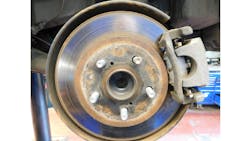Hit the brakes with a hybrid/electrified vehicle: Regenerative system or mechanical system, which one is it?
Customer concern: “I was at another repair shop, and they told me there is a problem with my regenerative braking system. It shakes when I brake, and they said they don't work on hybrid vehicles.”
This is a customer concern we are seeing more frequently, and it's extremely easy to determine which system is at fault and the direction of diagnosis or repairs that will be required.
We as technicians must remember that hybrid and electrified vehicles still have a basic braking system, yes, the regenerative braking system does play a big part in overall picture, but we can isolate which system it is very easily by just performing a simple road test.
As a “flat rate” technician, I am always looking for a way to streamline and make my diagnostic process more efficient. This issue has a simple resolution.
I am not going to completely go into how the whole regenerative braking system works, but just some basic components that are used. During a normal braking sequence, when the brakes are applied, AC current is generated from the electric machine, then it's directed to the power inverter where it is converted to DC current to charge the high-voltage battery if needed or redirected if the battery is at capacity.
What if we can just bypass or eliminate the regenerative system with a simple action while performing a road test? How?
It's as simple as just shifting the vehicle into “neutral” before applying the brakes, this disables the regenerative system.
Now, if the pulsation is still present we know that it is in the mechanical system, such as warped rotors. If there is no pulsation then we know that it's in the regenerative system, which then we can sell the appropriate time for diagnosis. That simple.
The thing to remember is that the mechanical braking system of a hybrid/electrified vehicle does not get exercised or used as much as on a non-hybrid/electrified vehicle, this presents a big service for us to sell.
Yes, the brake pads do last longer but this also causes the calipers and sides to freeze up, uneven pad wear, and rotors rust or pit. We inspect the mechanical brake system at all basic services, and recommend a brake “reconditioning” service, at major service intervals, which includes a complete inspection of the braking system, cleaning and lubricating all slides and related components, flushing brake fluid, and conditioning of the brakes which is just performing a few hard braking sequences with just by shifting into neutral (as mentioned above) to re-burnish the pads. As a technician, it's easy money.
The next time a customer arrives with “regenerative braking” concern, don't just push them down the road as you are passing up an easy service in most cases.
Information provided by EVPro+
About the Author

Russ Hutton
Working in the automotive aftermarket for over 38 years, Russ’ professional experience varies from being a shop owner, community college instructor, and diagnostic technician.
Currently, Russ supports the Mancinelli’s team in Denver as well as owning a new business venture, Green Drive Tech, LLC. in support of his commitment to the hybrid and electric vehicle service and repair industry.
Education is one of Russ’ top priorities with a passion and mission to improve and align his service and repair competencies with emerging advanced vehicle technologies, specifically in the EV industry. He has been revered as an excellent communicator by his colleagues and students and excels at showing a logical thought process and approach to automotive repair.
Certifications:
- ASE Certified Master Technician
- ASE Certified Advanced Level Specialist; L1
- ASE Certified Advanced Level Hybrid/Electric Specialist; L3
- SAE-ITC Evpro+ Level I Certified
- OSHA 19 Certified
